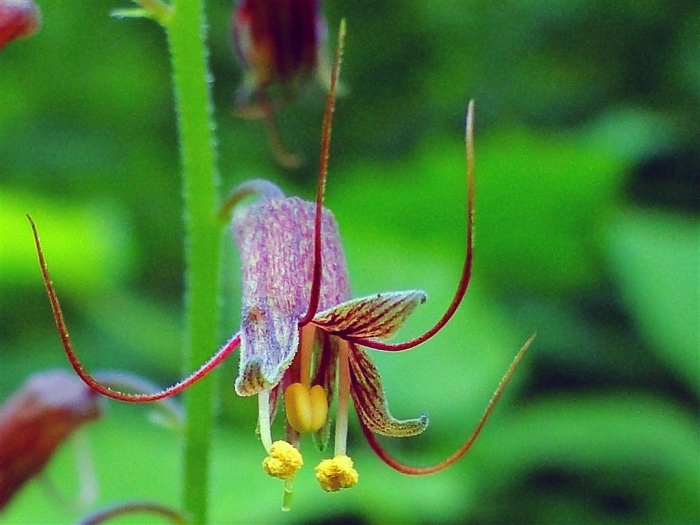Piggyback Plant
(Tolmiea menziesii)
Piggyback Plant (Tolmiea menziesii)
/
/

Digitalbcon1
CC BY 2.0
Image By:
Digitalbcon1
Recorded By:
Copyright:
CC BY 2.0
Copyright Notice:
Photo by: Digitalbcon1 | License Type: CC BY 2.0 | License URL: https://creativecommons.org/licenses/by/2.0 | Uploader: Flickr upload bot | Publisher: Wikimedia Commons | Title: Tolmiea_menziesii_-_Youth-on-Age.jpg | Notes: User created page with UploadWizard |





















































Estimated Native Range
Summary
Tolmiea menziesii, commonly known as Piggyback Plant, is an evergreen perennial herb native to moist, shaded forest floors and stream banks in the Pacific Northwest of North America. It typically grows to a height of 1-2 feet and a width of 2-3 feet. The plant features hairy, five to seven-lobed, toothed leaves that are notable for their reproductive strategy; plantlets form on the petiole near the base of each leaf, which can drop off, fall into the soil, and take root. The Piggyback Plant also reproduces by rhizomes and seeds. Its flowers are small, borne in a loose raceme, with a tubular purple-green to brown-green calyx and four linear or subulate red-brown petals, about twice the length of the sepals. The capsule fruit contains spiny seeds, but it is the foliage and the unique reproduction method that are of most interest.
The Piggyback Plant is valued for its ease of care and interesting foliage, making it a popular choice for houseplants and shaded garden groundcovers. It thrives in moist, well-drained soil rich in organic matter and prefers part shade to full shade conditions. Overexposure to sunlight can scorch the leaves, so it is important to avoid direct sun. It requires consistent moisture and does not tolerate drought well. While generally disease-free, it can occasionally suffer from root rot if overwatered or planted in poorly drained soils.CC BY-SA 4.0
The Piggyback Plant is valued for its ease of care and interesting foliage, making it a popular choice for houseplants and shaded garden groundcovers. It thrives in moist, well-drained soil rich in organic matter and prefers part shade to full shade conditions. Overexposure to sunlight can scorch the leaves, so it is important to avoid direct sun. It requires consistent moisture and does not tolerate drought well. While generally disease-free, it can occasionally suffer from root rot if overwatered or planted in poorly drained soils.CC BY-SA 4.0
Plant Description
- Plant Type: Herb
- Height: 1-2 feet
- Width: 1.5-3 feet
- Growth Rate: Moderate
- Flower Color: Brown
- Flowering Season: Spring
- Leaf Retention: Evergreen
Growth Requirements
- Sun: Part Shade
- Water: Medium
- Drainage: Slow, Medium, Fast
Common Uses
Bank Stabilization, Border Plant, Erosion Control, Groundcover
Natural Habitat
Moist, shaded forest floors and stream banks in the Pacific Northwest
Other Names
Common Names: Youth On Age, Thousand Mothers, , Pickaback, Pick-A-Back-Plant, Youth-On-Age, Tolmiée De Menzies, Kindje-Op-Moeders-Schoot, Mor Och Barn
Scientific Names: , Tolmiea menziesii, Heuchera menziesii, Leptaxis menziesii, Tiarella mensiesii, Ribes hysterix, Tiarella menziesii, Ribes senile, Tolmiea menziesii f. gemmifera,
GBIF Accepted Name: Tolmiea menziesii (Pursh) Torr. & A.Gray